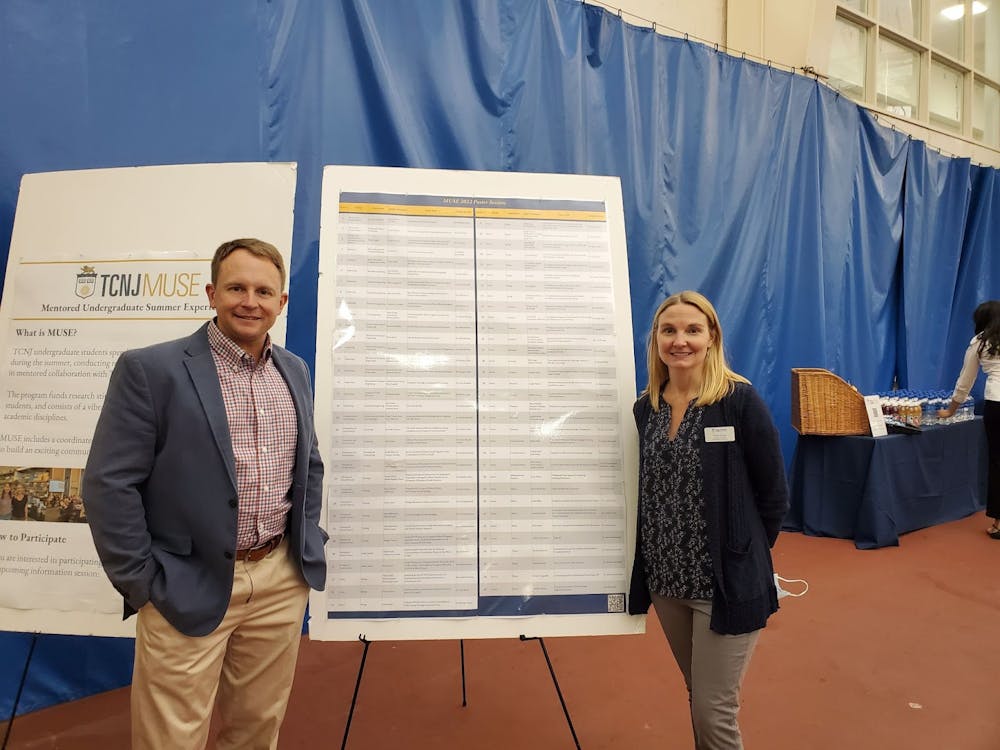By Rachel Lea
Correspondent
The Mentored Undergraduate Summer Experience program, or MUSE, is an eight week summer program in which students conduct research under the supervision of a professor. On Friday, Sept. 16, these students presented their work to the College in the Recreation Center. This year’s program was particularly special, since it was the first time it ran since the Covid-19 pandemic.
“The whole purpose [of MUSE] was to have an opportunity for students to do undergraduate research over the summer,” said Tracy Kress, a biology professor at the College who participated in MUSE as a faculty member this summer and co-director of MUSE. “It helps you understand and gain experience in different types of careers that you can have.”
Unlike most programs provided by the College, which have applications available when asked, students can only apply when asked directly by a professor wanting to participate. This faculty member could know the applicant from a previous project, class or simply word of mouth.
“What I look for is a student who’s really curious and passionate about learning,” said Kress, “and I imagine that the same is true for the other faculty on campus.”
Regardless of how or why they are asked to apply, the final decision is still up to the student, and most did it for the experience.
“I want to do genetics research, and my original plan was to do undergraduate research here in the first place, because that’s part of [the College’s] attractions,” said senior biology major Emily Behnke.
Since the Covid-19 pandemic, students have lost hands-on experience in their field of study/ Therefore, MUSE has been able to give them more opportunities to learn from their professors.
“But also, since my sophomore year was online, I missed out on a lot of lab stuff,” Behnke said. “That was when I had my genetics class, which would have been really important to do in person, but we did not have an option.”
Students like Behnke may explain why more than a hundred students participated in MUSE this year, the largest number since the program was started.
Once students agree to spend the majority of their summer on campus and present their work in the fall, they are promised a stipend of three thousand dollars, which was distributed during the program.
Students were also invited to live in Hausdoerffer or Phelps Hall free of charge.
“It was pretty much the same as living here during the year,” said Behnke.”Just barely any people, obviously.”
The only complaint among students was the lack of a consistent meal plan, since over the summer the College was not operating at full capacity. Although students can commute to participate in MUSE, it is highly encouraged to remain on campus.
“One reason that MUSE is important is, not only do you have the opportunity to work on a project, but the program is designed to also allow opportunities for you to network with other people on campus — to get to know the community of [the College] better,” said Kress.
MUSE arranges networking events that give students the opportunity to explore their majors and the careers they can lead to and learn how to best present themselves to achieve this goal. There are also social activities — ranging from game nights to a free baseball game — to encourage interactions beyond a student’s major.
“It actually helped a lot because it allowed for socialization to occur between different biology groups and different research groups in general,” said sophomore biology major Kiandry Minaya.
The MUSE program is continuously growing and looking for more students to participate.
“MUSE is for all of the schools on campus,” assured Kress. “We want more and more.”
As for the students themselves, a common consensus was that, despite the grueling work and lack of a meal plan, the experience they gained and the lessons they learned were worth it.
“If I weren’t graduating, I would totally do it again, and yes, I would totally recommend it to other students,” said Nicholas Alvear, a senior in electric engineering.
Students interested in participating in MUSE next year can attend the interest session through Zoom on Wednesday, Oct. 19 at 3 p.m.







